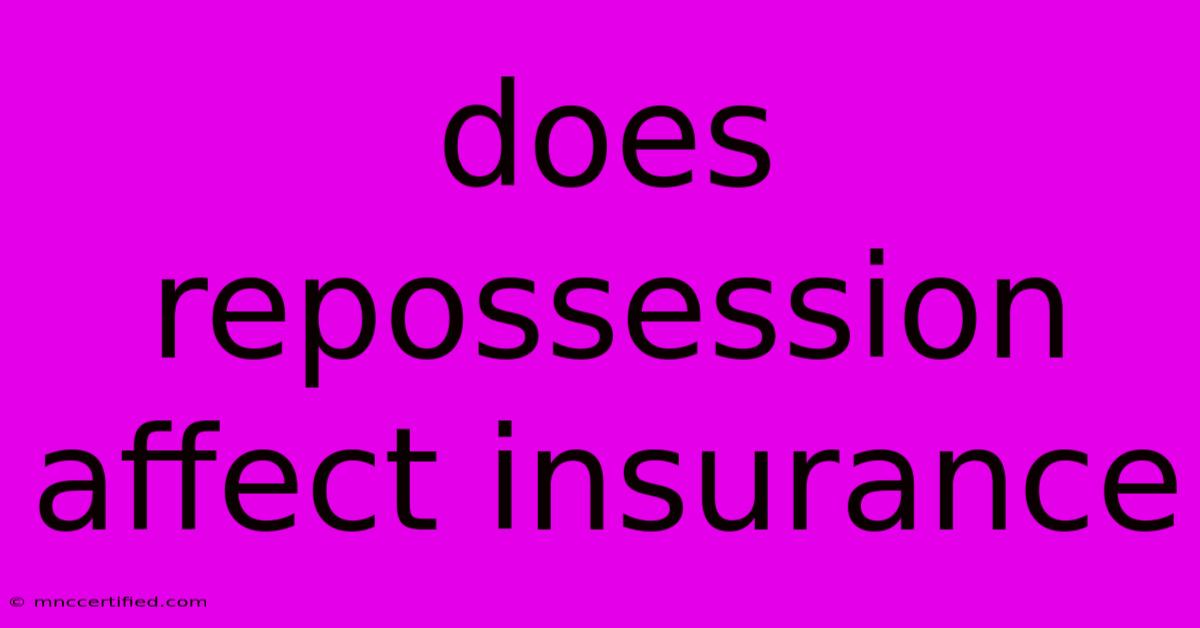Does Repossession Affect Insurance

Table of Contents
Does Repossession Affect Car Insurance? A Comprehensive Guide
Repossession is a stressful experience, leaving many wondering about the impact on their car insurance. The short answer is: yes, repossession significantly affects your car insurance, but the specifics depend on several factors. This comprehensive guide will break down how repossession impacts your coverage, your premiums, and what steps you should take.
Understanding the Impact of Repossession on Your Insurance
When your car is repossessed, the lender takes ownership, meaning you no longer have insurable interest. This lack of insurable interest means your existing car insurance policy becomes invalid. Your insurer will likely cancel your policy once they are notified of the repossession. This notification often comes from the lender themselves.
Here's a breakdown of the key consequences:
1. Policy Cancellation:
Your insurance provider will cancel your policy once they are aware of the repossession. This means you'll no longer have coverage for the vehicle, regardless of whether the repossession was a surprise or expected. Don't assume your coverage will automatically transfer. You need to actively inform your insurer.
2. Premium Increases:
Even if you obtain a new car and insurance policy afterward, your past repossession could significantly impact future premiums. Insurance companies view repossessions as a high-risk factor, indicating potential financial instability. This leads to higher premiums for your next policy. The impact on your rates will vary by insurer and your driving history.
3. Difficulty Obtaining New Coverage:
Securing a new car insurance policy after a repossession can be challenging. Insurers will scrutinize your application more carefully, considering your credit history and the circumstances surrounding the repossession. You might face higher premiums or even be denied coverage altogether. Providing accurate information on your application is crucial. Hiding the repossession could lead to policy cancellation later.
4. Gaps in Coverage:
The period between your repossession and obtaining new insurance will result in a gap in coverage. This leaves you vulnerable if you're involved in an accident or your new car is damaged during this time. Even a short gap can have serious financial consequences.
What to Do After Repossession
The aftermath of repossession requires proactive steps to mitigate further financial harm:
- Notify your insurer immediately: Don't delay informing your insurance company about the repossession. This will help avoid unexpected charges or further complications.
- Review your credit report: Repossession will negatively impact your credit score, which in turn affects your insurance premiums. Regularly monitoring your credit report is crucial.
- Shop around for new insurance: Compare quotes from multiple insurance providers. Explain the situation honestly and transparently to ensure you receive accurate quotes. Don't be afraid to negotiate.
- Consider non-standard insurance: If you struggle to find standard insurance, consider non-standard insurers that cater to higher-risk drivers. They often have higher premiums, but provide necessary coverage.
- Improve your financial situation: Address the underlying financial issues that led to the repossession to improve your chances of securing affordable insurance in the future. This might include budgeting, debt management, or credit counseling.
Keywords for SEO
- Repossession
- Car insurance
- Auto insurance
- Insurance after repossession
- Impact of repossession on insurance
- Repossessing a car
- Insurable interest
- Car insurance cancellation
- Higher insurance premiums
- Gap in coverage
- Credit score and insurance
By understanding the repercussions of repossession on your car insurance and taking proactive steps, you can navigate this difficult situation more effectively and minimize the long-term financial consequences. Remember, honesty and transparency with your insurer are key.

Thank you for visiting our website wich cover about Does Repossession Affect Insurance. We hope the information provided has been useful to you. Feel free to contact us if you have any questions or need further assistance. See you next time and dont miss to bookmark.
Featured Posts
-
Lsu Vs Florida Key Matchup
Nov 17, 2024
-
Carpenters Sparkling La Show
Nov 17, 2024
-
Watch Texas Vs Arkansas Football Live
Nov 17, 2024
-
England Vs South Africa Rugby Final Score
Nov 17, 2024
-
Airplane Insurance Cost Cessna 172
Nov 17, 2024